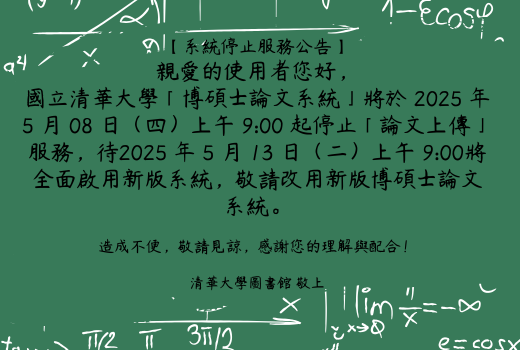|
參考文獻
壹、 中文部分
朱近之編(2010)。智慧的雲端運算-成就物聯網的未來基石,博碩文化。
吳宗成(2003)。國民小學知識管理組織文化現況調查研究:以彰化縣和
嘉義縣市為例。國立中正大學教育研究所碩士論文,未出版,嘉義。
吳清山(1992)。學校效能研究。臺北:五南。
李新鄉(2002)。探索學校組織的運轉手—學校文化的內涵與研究。教育
研究月刊,95,31-42。
李政翰(2004)。桃園縣國民中學學校組織文化與組織公民行為之關係研
究。台北輔仁大學教育領導與發展研究所碩士論文,未出版,台北。
林清江(1994)。教育社會學—我國社會與教育關係研究。台北:五南。
林麗珍(2008)。高雄縣國民小學主任人格特質、知覺校長領導風格、學校
組織文化與工作壓力關係之研究。國立臺南大學社會科教育學系教學碩
士班碩士論文,未出版,台南市。
林信亨 (2009)。雲端運算應用趨勢與我國商機研究,資策會產業情報研究所。
柯淑惠(2009)。台北市國民中學組織文化與教師知識分享意願關係之研究-以
自然與生活科技領域為例。國立臺灣師範大學教育學系碩士論文,未出版,
臺北市。
洪啟昌(2005)。教育行政機關組織文化、知識管理與組織學習關係之研
究。國立政治大學教育研究所博士論文,未出版,台北。
秦夢群(1997)。教育行政理論與應用。台北:五南。
許世軍(1997)。工作滿足個人特徵與組織氣候—文獻探討與實證研究。
國立政治大學學報,35,13-56。
張慶勳(1996)。國小校長轉化、互易領導影響學校組織文化特性與組織
效能之研究。國立高雄師範大學教育學系博士論文,未出版,高雄。
陳俊男(2007)。教師知覺組織文化與知識管理之關係調查—以新竹縣國
民小學為例。國立台北教育大學教育政策與管理研究所碩士論文,未
出版,台北。
黃重憲(2009)。淺談雲端運算,國立台灣大學計算機及資訊網路中心電子報,2009年3月20日,取自http://www.cc.ntu.edu.tw/chinese/epaper/0008/20090320_8008.htm
彭秀琴、張念慈(2010)。雲端運算下資訊安全之探討,行政院經建會。
鄭耀忠(2001)。高級中學行政主管知識管理態度、學校組織文化與學校
效能關係之研究。國立彰化師範大學工業教育學系碩士論文,未出版,彰化。
蔡培村、武文瑛(2005)。領導學:理論、實務與研究。高雄市:麗文文
化。
蔡進雄(2000)。國民中學校長轉型領導、互易領導、學校文化與學校效能關係
之研究。國立臺灣師範大學教育學系博士論文,未出版,臺北。
鄧瑋敦譯(2010)。雲端運算大解密,日經BP社出版局編,電腦人文化。
閻紀宇譯(2010)。Charles Babcock著,雲端運算革命的經營策略,麥格羅希爾。
謝佳容(2010)。以科技接受模式理論探討影響國民小學教師使用互動式電子白板
行為意願之研究。國立新竹教育大學教育學系碩士班學位論文,未出版,新
竹。
蘇良瓊(2009)。屏東縣國民小學學校組織文化與學校創新經營關係之研究。
國立屏東教育大學教育行政研究所碩士論文,未出版,屏東。
貳、 英文部分
Allan H. K. & Will W.K. (2008). Exploring teacher acceptance of e-learning
technology. Asia-Pacific Journal of Teacher Education Vol. 36, No. 3, 229–243.
Davis, F. D. (1989). Perceived usefulness, perceivedease of use, and user acceptance of
information technology. MIS Quarterly, September,319-340.
Hoy, W. K.,& Miskel, C. G. (2005). Educational administration: Theory, research,
and practice (7th ed.). Boston:Mc Graw-Hill.
Hofstede, G. (1991). Cultures consequences:International differences in work-related
values. California:Sage.
Ott, J. S. (1989). The organization culture perspective. California: Brooks/Cole Publishing
Company.
Park, S. Y. (2009). An Analysis of the Technology Acceptance Model in Understanding
University Students' Behavioral Intention to Use e-Learning. Educational
Technology & Society, 12 (3), 150–162.
Robbins, S. P. (1986). Organizational behavior: Concept, controversies, applications
(7th ed.). New Jersey: Prentice-Hall, Inc.
Schein, E. H. (1985). Organization culture and leadership. San Francisco:Jossey-Bass.
Venkatesh, V., Morris, M. G., Davis, G. B., & Davis, F. D. (2003). User acceptance of information technology: Toward a unified view. MIS Quarterly, 27(3), 425-478.
Wallach, E. J. (1983). Individual and organizations: The cultural match. Training and
Development Journal, 37, 28-36.
|
